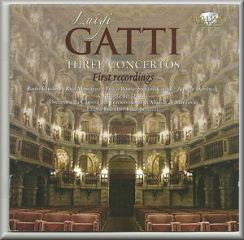Luigi Gatti - Three Concertos (2010)
Luigi Gatti - Three Concertos (2010)

1. Concertone in D Major, L7e.1 I. Maestoso con brio II. Larghetto espressivo III. Allegro con brio 2. Bassoon Concerto in F Major, L7e.4 I. Allegro spiritoso II. Romance: Adagio sostenuto III. Allegro assai 3. Piano Concerto in C Major, L7e.5 I. Allegro con spirito II. Alla romance: Andante larghetto III. Rondo: Allegro Paolo Ghedoni, Rita Macagna - violin Pietro Bosna – cello ( 1) Stefano Canuti – bassoon (2) Andrea Dembech – piano (3) Orchestra dei Ducati (1) Orchestra da Camera del Conservatorio di Musica di Mantova (2,3) Fausto Pedretti - conductor (1, 2) Luca Bertazzi – conductor (3)
In terms of later reputation, holding appointments in Salzburg has proved a decidedly mixed blessing for many a composer. Pretty well all of them have been utterly cast into the shadows – deservedly or otherwise – by Mozart. The life and works of Mozart now so completely constitute the ‘myth’ by which Salzburg defines itself – from Mozartkügeln to the Mozarteum, from Papagenoplatz (with its statue of the bird-catcher) to the Café Pamina – that for any other composer to be associated with Salzburg seems like a silent guarantee of unimportance. Even substantial composers such as Heinrich Biber (1644-1704), Georg Muffat (1653-1704) and Michael Haydn (1737-1806) are underrated in part because of the ‘Mozart effect’ - it is exceedingly difficult to find the tiny Michael Haydn museum in Salzburg actually open for visitors. Others, such as Giuseppe Francesco Lolli (1701-1778), Johann Ernst Eberlin (1702-1762), Franz Ignaz Lipp (1718-1798) and Joseph Hafeneder (1746-1784) might have been a good deal better known had they made their careers elsewhere. Luigi Gatti does at least seem, in recent years, to be attracting the sort of attention that may bring his music out from beneath the large shadow of Wolfgang Amadeus. He has been the subject of extensive research by Alessandro Lattanzi and others at the Mantua Conservatory – the first volume of a Thematic Catalogue was published in 2010. Conferences on Gatti – along with performances of music newly edited from manuscript – were held in Mantua in 2010 and in Salzburg in March of 2011.
Gatti was born at Lazise, on the eastern shore of Lake Garda. While the composer was still young the family moved to Mantua. It was there that Gatti took holy orders and proceeded to make a considerable reputation as a musician, as a singer and instrumentalist and as a composer. In 1773 he became primo maestro di capella. From 1768 onwards he had contributed very popular operas to the Mantuan stage. Though first approached as early as 1778, it was in 1782 that Gatti that he accepted an appointment from Archbishop Hieronymus Colleredo as Kapellmeister of Salzburg Cathedral - a position to which Leopold Mozart aspired and for the acquisition of which he never forgave Gatti. He held the post until his death on 1 March 1817.
Such music of Gatti’s as I had previously heard did not indicate a composer of any great originality; but it certainly suggested that Gatti had an assimilative and articulate musical mind, high technical competence and a genuine gift for lyricism. These qualities are evident, to varying degrees in the three works which receive their world premieres on this attractive disc.
The Concertone is a relatively early work, written and premiered in Mantua when Gatti was in his late twenties. It is a pleasant if essentially conventional work, tuneful and charming without any great profundity; the dialogue between the two solo violins is generally engaging and there are times when the prominence given to the cello comes close to making this a triple concerto. The first movement has some longueurs, but the larghetto espressivo which follows has a lyricism which speaks of its composer’s accomplishments as a man of opera and its interplay of solo voices produces some lovely moments. The closing allegro is full of vitality, public music of some sophistication and vigour. The other two works on the disc belong to Gatti’s years in Salzburg and they show – most notably in the case of the piano concerto – that Gatti was continuing to develop as a composer. The concerto for bassoon and orchestra is a very assured piece – woodwinds often seem to bring the best out of Gatti, his writing for oboe elsewhere being equally impressive. The writing here calls for some fair agility from the soloists and contains a number of appealing melodies, not least in the opening allegro spiritoso. The central slow movement - marked ‘Romance: Adagio sostenuto’ - has a lyrical serenity which is striking. Unfortunately the final movement is incomplete in the surviving score and has had to be reconstructed - in an idiomatically convincing fashion - by Giordano Fermi. It is in the piano concerto in C that, as Alessandro Lattanzi observes in his booklet notes, one hears Gatti’s familiarity with the example of the young Mozart and also some anticipations of the next generation of composers. Along with the bassoon concerto this is a work that makes one eager to hear more of Gatti’s music. The elegance of structure and the harmonic subtlety, as well as some attractive melodic writing sustain one’s interest and reward one’s attention through all three movements.
Though one might imagine even finer performances than these on the present disc, there is a great deal to enjoy here and none of the soloists, conductors and orchestras do anything other than put a persuasive case for Gatti. One hopes, indeed, that they will return to his music for some future CDs. ---Glyn Pursglove, musicweb-international.com
download (mp3 @320 kbs):
yandex 4shared mega mediafire zalivalka cloudmailru oboom uplea
Zmieniony (Czwartek, 04 Luty 2016 09:23)








